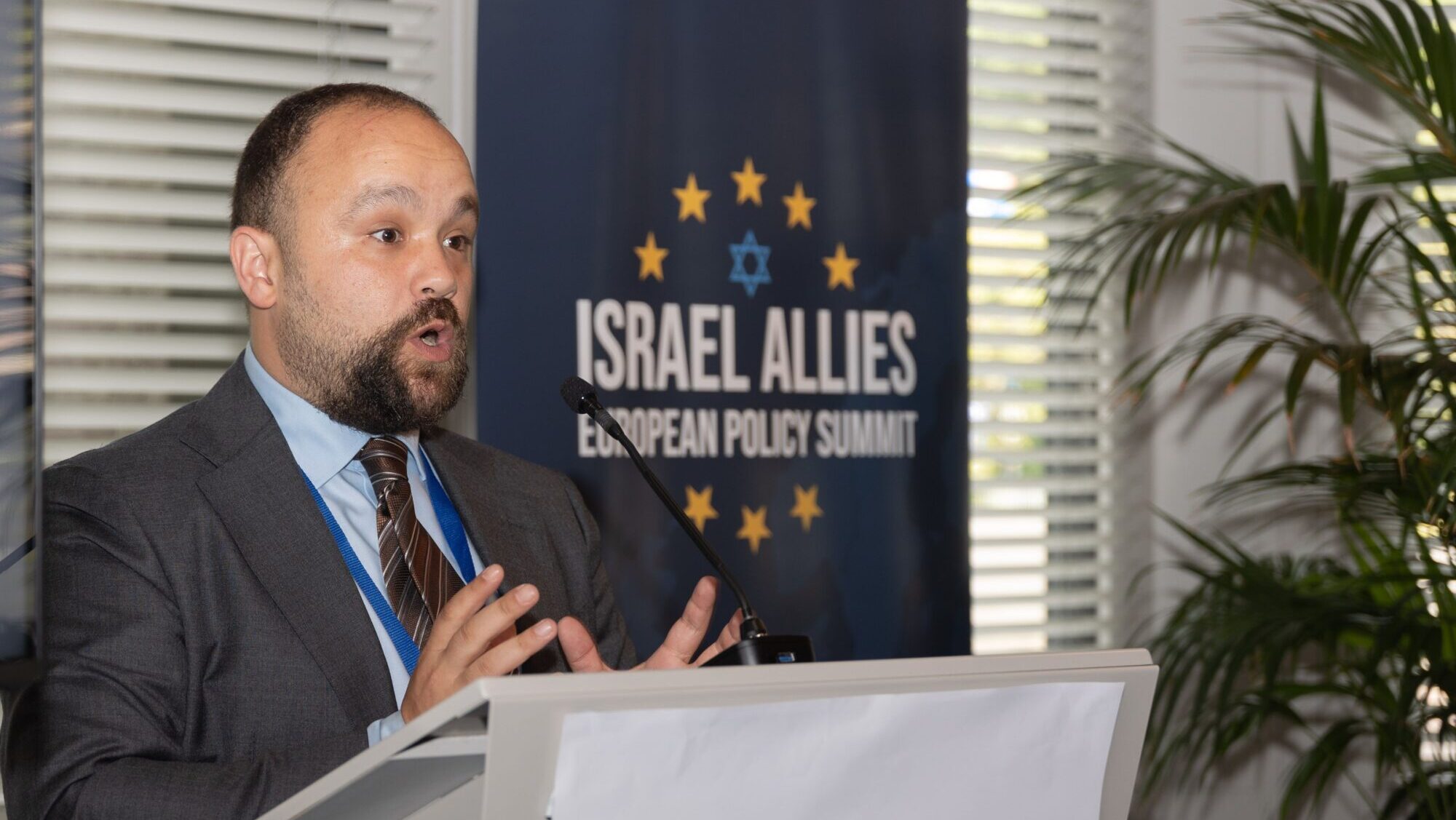
Raouf Leeraar is the Policy Director at Israel Allies Foundation Europe (IAF), the European arm of an organization founded to equip legislators worldwide to advocate for Israel.i Leeraar is also a former Israeli Defence Forces officer (1st Lieutenant, Res.), he served in international relations on the Golan Heights and at the Israel National Defense College.
Since October 7th, Israel has not only been engaged in a war against the terrorist organization Hamas but has also faced relentless attacks from international organizations and courts for taking actions that any sovereign nation would undertake: fighting terrorism and securing the return of hostages.
The IAF Europe network functions as Israel’s ‘Diplomatic Iron Dome,’ providing strategic, objective-based information to counter these challenges. Currently, IAF Europe is active in 20 European parliaments, including the European Parliament.
To support policymakers, IAF Europe has developed an extensive network of experts and legal professionals who produce concise policy papers on complex topics related to Israel. We counter false narratives, such as the accusations of genocide and apartheid against Israel, address the ongoing legal battles at the International Court of Justice (ICJ) and the International Criminal Court (ICC), and propose alternative strategies regarding defunding UNRWA and a renewed approach to Jerusalem.
Frankly, no. While there has always been a surge in antisemitic rhetoric and violence whenever the Israel Defense Forces engage in military operations against terrorist groups in Gaza, Judea, and Samaria, the scale and intensity of hatred witnessed in recent months have been shocking. For decades, Jewish communities across Europe have reported rising antisemitism, primarily originating from radicalized immigrants and extreme left-wing activists. These groups played a decisive role in the wave of attacks, demonstrations, and incidents over the past year.
Even more alarming, however, has been the systemic disregard—or even tacit approval—by politicians, university boards, and local authorities regarding the incitement of violence against Israel. Universities, in particular, have become breeding grounds for antisemitism, where Jewish students face harassment and intimidation for merely existing.
In the Netherlands, for instance, an Israeli student at the Royal Academy of the Arts in The Hague chose to return to Israel, stating that she would rather live under constant rocket fire than endure the toxic hostility on campus. At this institution, Gaza was repeatedly equated with the Nazi-era Warsaw Ghetto, and students were even graded for designing a T-shirt featuring a Molotov cocktail with a slogan calling for Israel’s destruction. Despite numerous complaints, university authorities failed to take action, leaving Jewish students vulnerable.
There is a fundamental distinction between advocating for better humanitarian conditions for innocent civilians in Gaza and glorifying terrorism. As long as legislators, authorities, and academic institutions fail to acknowledge or act upon this distinction, the problem will escalate, ultimately endangering not just Jews but the very fabric of our societies.
This incident exposes deeper societal issues. First, this was not a clash between rival football fans. The Ultras of Ajax Amsterdam and Maccabi Tel Aviv have maintained a strong friendship since the early 2000s, making the claim of football-related riots baseless. On that horrific night—mere hours after the official Kristallnacht commemoration—groups of mostly Moroccan and Algerian men launched hit-and-run attacks on Maccabi supporters returning from a match at the Johan Cruyff Stadium. In essence, Jews were hunted in the streets of Amsterdam. Once again.
Evidence later emerged that WhatsApp and Telegram groups had been created in advance to coordinate these attacks. Messages explicitly stated, “We are going to hunt Jews” and “We will finish Hitler’s job.” This premeditation debunks any notion that the violence was spontaneous or provoked. Moreover, the perpetrators proudly filmed their actions—just as Hamas documented its atrocities on October 7th and as ISIS did when executing hostages. This was not mere hooliganism; it was ideological extremism.
However, what followed was a familiar pattern. Initially, there was widespread condemnation of the antisemitic attacks. But as soon as investigations revealed that the perpetrators were predominantly Muslim immigrants, the narrative shifted. Suddenly, the attackers became victims—portrayed as marginalized individuals reacting to discrimination or anger over Gaza—while the actual victims were subtly blamed for their supposed provocation.
This moral relativism, compounded by cultural and intellectual degradation in the West, prevents honest discussions about the consequences of unchecked immigration and radicalization. If we fail to unequivocally distinguish between those who seek to destroy Jews and those who cherish life and democracy, the future of Jewish communities in Europe will remain in peril, and Western civilization as a whole will diminish.
While law enforcement has worked to identify and prosecute perpetrators, progress has been slow. Despite the scale of the attacks—dozens of hit-and-run assaults across the city—only ten individuals have been arrested. This is unacceptable. However, these events have reignited the national debate on immigration and integration, though concrete policy actions remain to be seen.
Under the previous Trump administration, the Abraham Accords demonstrated that peace between Israel and Arab nations is achievable through economic diplomacy. However, Europe played only a marginal role in these developments due to its continued insistence on a failed two-state solution. Until European leaders acknowledge that both Israelis and Palestinians have moved beyond this outdated framework, their influence will remain limited. The time has come for innovative approaches that prioritize security, stability, and economic cooperation—principles that Trump seems poised to advance once again.
